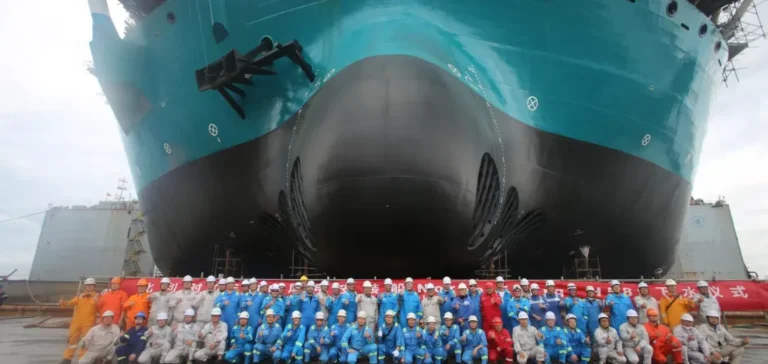On 3 July, the wind-turbine installation vessel Norse Energi was launched at the Yantai CIMC Raffles Offshore yard in Shandong Province, China. The milestone comes six months after first steel cutting, following what DEME describes as a rigorous schedule. Measuring 214 metres in length, the jack-up was designed by Dutch firm GustoMSC to handle turbines with rotor diameters above 300 metres and monopiles of up to 3,000 tonnes. The Belgian group plans commercial delivery in the first quarter of 2026, immediately after sister ship Norse Wind, which is expected in the fourth quarter of 2025.
Capabilities tailored to XXL components
Norse Energi offers a clear deck of 2,500 square metres and a main crane able to lift 5,000 tonnes, essential capacity for next-generation foundations longer than 120 metres. The propulsion system includes a dual-fuel mode that can accept green methanol when industrial-scale supply becomes available. A four-megawatt-hour onboard battery is intended to smooth power peaks during lifting operations and reduce instantaneous fuel burn. Norwegian classification society DNV issued its approval in principle for this energy architecture in March, confirming compliance with the latest efficiency standards.
Rising pressure on the specialised-vessel market
Consultancy 4C Offshore forecasts that average offshore turbine power will exceed fifteen megawatts by 2028, rapidly increasing the masses to be installed. Broker Clarksons Shipping projects day rates for next-generation heavy-lift units could pass $350,000 by 2027. DEME is addressing this tension by adding three specialised vessels to its portfolio since 2021, thereby strengthening its contractual coverage of European, US and Asian tenders. Norse Energi’s launch fits this plan, with unit value estimated at €350 mn ($380 mn) in data compiled by Offshore Energy on 3 May.
Consolidated Sino-Belgian collaboration
Partnership between DEME and CIMC Raffles dates back to 2017, when the two companies cooperated on cable-lay vessels. “Joint engineering teams reduced scheduling risks by optimising block integration,” yard director Wang Jian said in the company statement. DEME notes that the project has recorded zero lost-time accidents since construction began. No contract figure has been released, yet the group emphasises that all phases met the safety criteria set out in the initial agreement.
Logistics and mobility for future campaigns
Once delivered, Norse Energi will sail directly to the North Sea for a series of load tests before potentially joining emerging Asia-Pacific markets. Building in China shortens transit distance for projects in Japan, South Korea or Taiwan, cutting mobilisation days by ten % compared with a European departure. DEME’s offshore mobility class will then comprise five units able to transport giant turbine components, reinforcing the group’s offering against Dutch and Danish competition. Global Wind Energy Council data show that the average capacity of turbines connected last year reached twelve megawatts, confirming the commercial appeal of a fleet geared towards larger machines.
Commissioning outlook
Quayside outfitting will continue for eight months, including installation of winches, dynamic-positioning systems and accommodation for 160 crew. Sea trials are scheduled for November, followed by a compliance inspection by DNV before handover. DEME has already secured contract options for Norse Energi on British wind farms scheduled to start production in 2027. Chief executive Luc Vandenbulcke stated that the company “invests to maintain a service level aligned with the sector’s acceleration”, without giving further details of the order book.






















